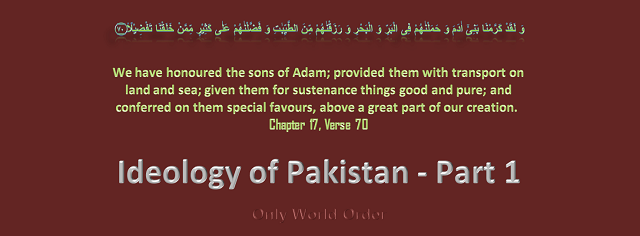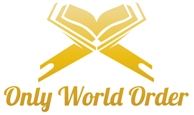Ideology of Pakistan Part 1/3

The history of mankind makes tragic reading. Down through the ages, we come across a series of sequences of the rise, growth, decline and fall, not only of nations but even of their civilizations and cultures. No doubt, man has all along shown a remarkable constructive genius, having attained many an awe-inspiring success, despite occasional setbacks and natural catastrophes, but his constructive genius was always undermined by some inherent weakness underlying his ideals, or his way of life which ultimately brought about a disastrous end to his efforts.
Nevertheless, there have been some notable exceptions in the series of sequences when the idea of universal welfare of mankind took practical shape, but the main characteristic in all those civilizations, always remained one of frustration. Man struggled hard to find some satisfactory solution to his problems but failed. Human intellect, limited as it is, helped him little, because it is not aware of any source of knowledge other than itself. There was only one guide left for mankind in this difficult quest, and that confidently proclaimed its competency to lead them to their goal. Refer to The Noble Quran Chapter 20, Verse 50:
قَالَ رَبُّنَا الَّذِیْۤ اَعْطٰی كُلَّ شَیْءٍ خَلْقَهٗ ثُمَّ هَدٰی۵۰
Translation:
He said: “Our Lord is He Who gave to each (created) thing its form and nature, and further, gave (it) guidance.”
The guidance which comes directly from His Supremacy Allah is known as “Revelation”. It has all along been revealed to mankind through the agency of various Rusul (Messengers). But, unfortunately, due to the ravages of time and human tampering with it, the text of the Scriptures, the message delivered by the pre-Islamic Ambiya (Messengers), could not be preserved long in their original form. Eventually, about fourteen plus centuries ago, the complete and final version of that guidance was revealed to mankind through the last messenger His Excellency Muhammed (peace be upon him). This version of the divine guidance is embodied exactly in its original form in The Noble Quran.
The responsibility of the Rasool (Messenger), to whom divine guidance was revealed, was not only to communicate his revelation to others, but also to establish a socio-economic order in the light of that guidance. The last Rasool/Nabi His Excellency Muhammed (peace be upon him) established this order which fully recognized dignity of all human beings (Chapter 17, Verse 70):
وَ لَقَدْ كَرَّمْنَا بَنِیْۤ اٰدَمَ وَ حَمَلْنٰهُمْ فِی الْبَرِّ وَ الْبَحْرِ وَ رَزَقْنٰهُمْ مِّنَ الطَّیِّبٰتِ وَ فَضَّلْنٰهُمْ عَلٰی كَثِیْرٍ مِّمَّنْ خَلَقْنَا تَفْضِیْلًا۠۷۰
Translation:
We have honored the sons of Adam; provided them with transport on land and sea; given them for sustenance things good and pure; and conferred on them special favors, above a great part of our creation.
The pursuit of individual interest was replaced by the ideal of the good of the humanity at large. Oppression and exploitation were abolished, and justice and equity prevailed. The dependence of man and the subjugation of one over another was brought to an end. Every individual was assured the proper satisfaction of his needs. He, thereby, led a life full of satisfaction, peace and harmony. He did not owe obedience to any person or power, except the Divine Laws enshrined in The Noble Quran. Briefly, that order completely put an end to the rule of man over man, in any form, and with it the evil of capitalism. This order was called “Deen” in the Quranic terminology.
This social order prevailed during the life time of His Excellency Muhammed (peace be upon him) and for some time thereafter, when the forces of exploitation began to raise their ugly heads again. They scored their first success with the establishment of Malookiyat (Kingship) sustained by capitalism. To ensure their survival and consolidation, these forces availed themselves of the cooperation of men who appeared in the robes of piety and spoke in the name of God. They posed as the interpreters of God’s Will and thus distorted principles and tenets of Deen which no longer remained a living force in the society and were reduced to a set of soul-less beliefs, lifeless dogmas and formal rituals divorced from reason and realities of life.
They framed rules and laws to suit the purpose of monarchy and sought to keep the common man entangled in the labyrinth of these dogmas and rituals, and the exploiters, religious as well as temporal, were left free to maintain their stranglehold upon the defrauded masses. This was the metamorphosis of Deen into Mazhab (religion), which word, by the way, does not occur anywhere in The Noble Quran. The Book of His Supremacy Allah, however, remained intact, since the responsibility of its preservation has been taken by Allah Himself, although it was never allowed to play any part in the practical life of the Muslims.
This state of affairs prevailed throughout the Muslim countries for centuries together where Mazhab was accepted as true Islam. We should, however, consider ourselves fortunate in as much as a voice was raised in our time and from our own country, to distinguish between Deen and Mazhab, and the Ummah was called upon to revive true Islam in the light of The Noble Quran. This was the voice of Iqbal (The poet of the East and co-founder of Pakistan), the great thinker, and still greater scholar of The Noble Quran. This, he said, was possible only if we had a piece of land in which a State was established purely on the lines indicated by The Noble Quran, thereby wiping out completely the rule of man, in any form, be it capitalism or priestcraft.
This scheme of his he pronounced in his Presidential Address of the All-India Muslim League session at Allahabad, in 1930. Such a State, he said:
“Would mean security and peace for India resulting from an internal balance of power, and for Islam an opportunity to rid itself of the stamp that Arabian Imperialism was forced to give it, to mobilize its law, its education, its culture, and to bring them into closer contact with its own original spirit and with the spirit of modern times.”
Two years later, while addressing the nation at the Annual Session of the All-India Muslim Conference at Lahore, on March 21, 1932, he said:
“The possibilities of the faith you represent are not yet exhausted. It can still create a new world where the social rank of man is not determined by his caste or color, or the amount of the dividend he earns, but by the kind of life he lives, where Capital cannot be allowed to accumulate so as to dominate the real producer of wealth. This superb ideal of your faith, however, needs emancipation from the medieval fancies of theologians and legists.
Spiritually, we are living in a prison-house of thoughts and emotions which, during the course of centuries, we have woven round ourselves. And be it further said to the shame of us – men of older generation – that we have failed to equip the younger generation for the economic, political and even religious crises that the present age is likely to bring. The whole community needs a complete overhauling of its mentality in order that it may again become capable of feeling the urge of fresh desires and ideals.”
This point i.e. to get rid of the “man-made Islam” was so basic and important that he laid emphasis on it time and again. In his famous six (to be more accurate, seven) lectures, he elaborated the theme in the words of (the late) Grand Vizier of Turkey, Said Haleem Pasha, who had said:
“During the course of history, the moral and social ideals of Islam have been gradually de-Islamized through the influence of local character, and pre-Islamic superstitions of Muslim nations. These ideals today are more Iranian, Turkish or Arabian than Islamic. The pure brow of the principal of Touheed (obedience to the Book of Allah alone) has received, more or less, an impress of heathenism and the universal and impersonal character of the eithical ideals of Islam has been lost through a process of localisation. The only alternative open to us then is to tear off from Islam the hard crust which has immobilised an essentially dynamic outlook on life, and to rediscover the original verities of freedom, equality and solidarity with a view to rebuild our moral, social and political ideals out of their original simplicity and universality.”
(Iqbal: Reconstruction of Religious Thought in Islam)
This was the purpose to be achieved, for which Allama Iqbal had given the idea of acquiring a piece of land to establish therein a State which could be identified as a true Islamic State – a State built on the foundations of The Noble Quran. This was to be a unique State amongst various States of the world.
One of the fundamental factors which makes an Islamic State unique amongst various States of the world, whatever their form of Government, is its principle of law making. As already stated, according to The Noble Quran, all human beings are equal and worthy of equal respect and dignity. It necessarily follows, therefore, that no man has the right to exploit another man or to use him as a means in furthering his personal interests. If society were organized on this basis, there would be neither rulers nor the ruled; none would be permitted to compel others to obey him. His Sumpremacy Allah alone would be obeyed. Says the Quran (Chapter 3, Verse 79):
مَا كَانَ لِبَشَرٍ اَنْ یُّؤْتِیَهُ اللّٰهُ الْكِتٰبَ وَ الْحُكْمَ وَ النُّبُوَّةَ ثُمَّ یَقُوْلَ لِلنَّاسِ كُوْنُوْا عِبَادًا لِّیْ مِنْ دُوْنِ اللّٰهِ وَ لٰكِنْ كُوْنُوْا رَبّٰنِیّٖنَ بِمَا كُنْتُمْ تُعَلِّمُوْنَ الْكِتٰبَ وَ بِمَا كُنْتُمْ تَدْرُسُوْنَۙ۷۹
Translation:
It is not (possible) that a man, to whom is given the Book, and Wisdom, and the prophetic office, should say to people: “Be ye my worshippers rather than Allah`s”: on the contrary (He would say) “Be ye worshippers of Him Who is truly the Cherisher of all: For ye have taught the Book and ye have studied it earnestly.”
The Noble Quran forbids man to arrogate to himself the right to rule over other men, and yet it does not advocate a lawless, anarchical society. What it does is to lay down the principle that His Supremacy Allah alone has the right to rule over them (Chapter 12, Verse 40):
مَا تَعْبُدُوْنَ مِنْ دُوْنِهٖۤ اِلَّاۤ اَسْمَآءً سَمَّیْتُمُوْهَاۤ اَنْتُمْ وَ اٰبَآؤُكُمْ مَّاۤ اَنْزَلَ اللّٰهُ بِهَا مِنْ سُلْطٰنٍ ؕ اِنِ الْحُكْمُ اِلَّا لِلّٰهِ ؕ اَمَرَ اَلَّا تَعْبُدُوْۤا اِلَّاۤ اِیَّاهُ ؕ ذٰلِكَ الدِّیْنُ الْقَیِّمُ وَ لٰكِنَّ اَكْثَرَ النَّاسِ لَا یَعْلَمُوْنَ۴۰
Translation:
“If not Him, ye worship nothing but names which ye have named, – ye and your fathers, – for which Allah hath sent down no authority: the command is for none but Allah: He hath commanded that ye worship none but Him: that is the right religion, but most men understand not…
And none has the right to any share in it (Chapter 18, Verse 26):
قُلِ اللّٰهُ اَعْلَمُ بِمَا لَبِثُوْا ۚ لَهٗ غَیْبُ السَّمٰوٰتِ وَ الْاَرْضِ ؕ اَبْصِرْ بِهٖ وَ اَسْمِعْ ؕ مَا لَهُمْ مِّنْ دُوْنِهٖ مِنْ وَّلِیٍّ ؗ وَّ لَا یُشْرِكُ فِیْ حُكْمِهٖۤ اَحَدًا۲۶
Translation:
Say: “Allah knows best how long they stayed: with Him is (the knowledge of) the secrets of the heavens and the earth: how clearly He sees, how finely He hears (everything)! They have no protector other than Him; nor does He share His Command with any person whatsoever.
Sovereignty belongs to His Supremacy Allah alone.
